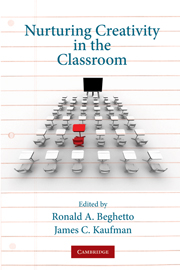Crossref Citations
This Book has been
cited by the following publications. This list is generated based on data provided by Crossref.
Reynolds, Candyce
Stevens, Dannelle D.
and
West, Ellen
2013.
“I’m in a Professional School! Why Are You Making Me Do This?” A Cross-Disciplinary Study of the Use of Creative Classroom Projects on Student Learning.
College Teaching,
Vol. 61,
Issue. 2,
p.
51.
Henshon, Suzanna E.
2013.
Finding a New Vision of Gifted Education: An Interview with David Yun Dai.
Roeper Review,
Vol. 35,
Issue. 2,
p.
72.
Daniels, Susan
2013.
Teaching Creatively and Teaching Creativity.
p.
3.
Kim-Eng Lee and Lo Mun Ling, Christine
Tan-Chia, Lydia
Fang, Yanping
and
Chew Ang, Pow
2013.
Innovating the Singapore English Language curriculum through lesson study.
International Journal for Lesson and Learning Studies,
Vol. 2,
Issue. 3,
p.
256.
Kaufman, James C.
and
Beghetto, Ronald A.
2013.
In Praise of Clark Kent: Creative Metacognition and the Importance of Teaching Kids When (Not) to Be Creative.
Roeper Review,
Vol. 35,
Issue. 3,
p.
155.
Beghetto, Ronald A.
and
Kaufman, James C.
2014.
Classroom contexts for creativity.
High Ability Studies,
Vol. 25,
Issue. 1,
p.
53.
Coxon, Steve
and
Puryear, Jeb
2014.
Organic Creativity in the Classroom: Teaching to Intuition in Academics and the Arts. Piirto, J. (Ed.). (2013).
Roeper Review,
Vol. 36,
Issue. 4,
p.
274.
Plucker, Jonathan A.
and
Callahan, Carolyn M.
2014.
Research on Giftedness and Gifted Education.
Exceptional Children,
Vol. 80,
Issue. 4,
p.
390.
Henshon, Suzanna E.
2015.
Prospector Leading the Search for Creative Educational Gold: An Interview With Ronald A. Beghetto.
Roeper Review,
Vol. 37,
Issue. 3,
p.
119.
Hanchett Hanson, Michael
2015.
The Ideology of Creativity and Challenges of Participation.
Europe’s Journal of Psychology,
Vol. 11,
Issue. 3,
p.
369.
Alencar, Eunice M. L. Soriano de
Fleith, Denise de Souza
Boruchovitch, Evely
and
Borges, Clarissa Nogueira
2015.
Criatividade no Ensino Fundamental: Fatores Inibidores e Facilitadores segundo Gestores Educacionais.
Psicologia: Teoria e Pesquisa,
Vol. 31,
Issue. 1,
p.
105.
Hui, Anna N. N.
He, Mavis W. J.
and
Ye, Shengquan Sam
2015.
Arts education and creativity enhancement in young children in Hong Kong.
Educational Psychology,
Vol. 35,
Issue. 3,
p.
315.
Beghetto, Ronald A.
2016.
Creative Learning: A Fresh Look.
Journal of Cognitive Education and Psychology,
Vol. 15,
Issue. 1,
p.
6.
Tan, Liang
Lee, Shu
Ponnusamy, Letchmi
Koh, Elizabeth
and
Tan, Keith
2016.
Fostering Creativity in the Classroom for High Ability Students: Context Does Matter.
Education Sciences,
Vol. 6,
Issue. 4,
p.
36.
Zittoun, Tania
and
Gillespie, Alex
2016.
The Palgrave Handbook of Creativity and Culture Research.
p.
225.
Rabi, Norfishah Mat
and
Masran, Mohd Nasir Bin
2016.
Creativity characteristics in teaching students with learning disabilities among pre-service teacher in UPSI.
International Journal of ADVANCED AND APPLIED SCIENCES,
Vol. 3,
Issue. 11,
p.
66.
Glăveanu, Vlad Petre
Branco, Angela
and
Neves-Pereira, Monica Souza
2016.
Nurturing Creativity in the Classroom.
p.
287.
Beghetto, Ronald A.
and
Plucker, Jonathan A.
2016.
Creativity and Reason in Cognitive Development.
p.
72.
Bonnardel, Nathalie
and
Didier, John
2016.
Enhancing Creativity in the Educational Design Context: An Exploration of the Effects of Design Project-Oriented Methods on Students’ Evocation Processes and Creative Output.
Journal of Cognitive Education and Psychology,
Vol. 15,
Issue. 1,
p.
80.
Waite, Susan Field
and
Robbins, Kirsten
2017.
The Wiley International Handbook of Educational Leadership.
p.
29.



